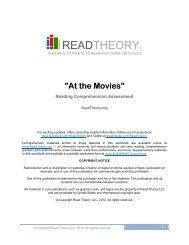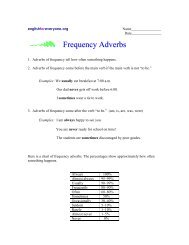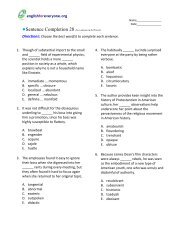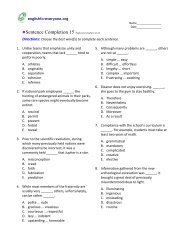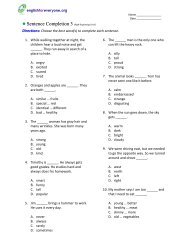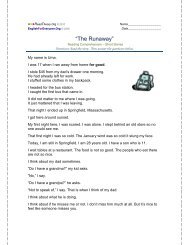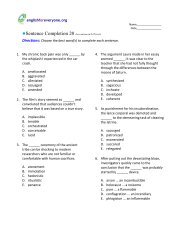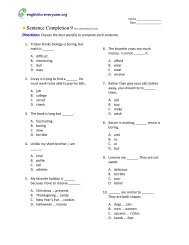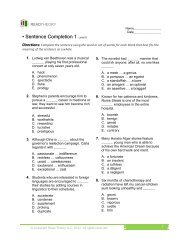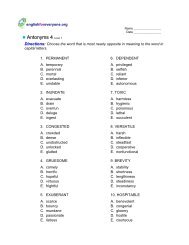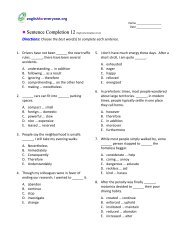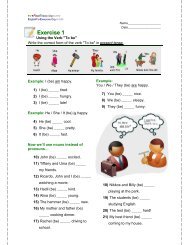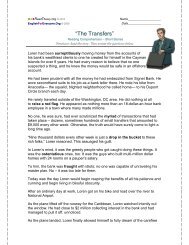“Accused” - English for Everyone
“Accused” - English for Everyone
“Accused” - English for Everyone
Create successful ePaper yourself
Turn your PDF publications into a flip-book with our unique Google optimized e-Paper software.
●●●ReadTheory.Org © 2010 Name________________<br />
<strong>English</strong>For<strong>Everyone</strong>.Org © 2008 Date________________<br />
<strong>“Accused”</strong><br />
Reading Comprehension – Short Stories<br />
Directions: Read the story. Then answer the questions below.<br />
Elizabeth was brooding in her room. She had sought asylum there<br />
since spurious gossip about her began circulating at Seagrove<br />
Academy last week.<br />
Not that Elizabeth had ever been considered a social butterfly. She preferred to<br />
live vicariously through the stories of her more brazen friends: late night partying,<br />
fraternizing with boys, childish pranks. Still, she had taken to being more by<br />
herself than usual since the allegations surfaced.<br />
She was up <strong>for</strong> consideration <strong>for</strong> the highly coveted Blauvelt Award, a<br />
scholarship recognizing “academic integrity and promise.” A student had given<br />
headmaster Billings an anonymous “tip” that Elizabeth had cheated on several<br />
tests this year.<br />
The accusations were laughable. Elizabeth had long been a stellar student at<br />
Seagrove. She lacked a natural intelligence – this was true. However, she<br />
compensated <strong>for</strong> this deficit through diligence and perseverance; she was very<br />
thorough in her studies and exhibited an almost relentless determination.<br />
Still, the accusations had given the recommendation committee pause. On Friday<br />
Elizabeth had been called to Mr. Billings’ grand office, where she was asked<br />
copious questions about her recent exams. The experience was quite traumatic.<br />
Seagrove was an elite school. Most of its students came from privileged<br />
backgrounds. This was not the case <strong>for</strong> Elizabeth. Her family had little money.<br />
She attended Seagrove on a full scholarship. The Blauvelt Award would help her<br />
family pay <strong>for</strong> college.<br />
So, it was with the same diligence which she applied to her studies that Elizabeth<br />
planned to unmask her accuser. She opened the school directory on her bed and<br />
began combing through the names.<br />
Seagrove was such a small and insular community. Twenty-one kids would be in<br />
her graduating class. Elizabeth knew it was inevitable that the person spreading<br />
rumors about her would come to light. It was just a matter of time.
Questions:<br />
1) As used at the beginning of the story, which is the best synonym <strong>for</strong><br />
spurious?<br />
A. ashamed<br />
B. ghastly<br />
C. general<br />
D. untrue<br />
2) What is the meaning of “diligence and perseverance" as used in paragraph 4?<br />
A. efficiency and willpower<br />
B. natural ability<br />
C. hard work and discipline<br />
D. painstaking attention<br />
3) Which of the following is best<br />
described as brazen?<br />
A. A dog chases a cat up a tree.<br />
B. A man walks his dog during the<br />
rain.<br />
C. A woman steps in front of a bus<br />
to make it to stop.<br />
D. A little girl wins the National<br />
Spelling Bee with hard work.<br />
5) How is Elizabeth different than many<br />
of her peers?<br />
A. She is diligent.<br />
B. She is honest.<br />
C. She is not wealthy.<br />
D. She likes to be alone.<br />
4) Why would Elizabeth have likely<br />
been disqualified from receiving the<br />
Blauvelt Award if caught cheating?<br />
A. Mr. Billings said this was the<br />
case.<br />
B. Awards are never given to<br />
cheaters.<br />
C. The award is based on academic<br />
integrity.<br />
D. Cheating would have made the<br />
award illegitimate <strong>for</strong> college use.<br />
6) Seagrove Academy was<br />
A. a school <strong>for</strong> gifted students<br />
B. a school with many wealthy<br />
students<br />
C. a school where many kids lied<br />
and cheated<br />
D. a large school where it was hard<br />
to get to know people
Questions (continued):<br />
7) What does the reader learn about<br />
the student who accused Elizabeth<br />
of cheating?<br />
I. The student is a <strong>for</strong>mer friend of<br />
Elizabeth.<br />
II. The student does not want<br />
anyone to know who he or she<br />
is.<br />
III. The student is either lying or<br />
mistaken.<br />
A. I only<br />
B. I and II<br />
C. II and III<br />
D. I, II, and III<br />
9) Why is Elizabeth so sure that she<br />
will learn who has accused her of<br />
cheating?<br />
A. Her friends will help her.<br />
B. The community is so small.<br />
C. She thinks the person will come<br />
<strong>for</strong>ward.<br />
D. She thinks the person will be the<br />
recipient of the Blauvelt Award.<br />
11) Who is the antagonist in this story?<br />
A. Elizabeth, because she is the<br />
leading character<br />
B. Mr. Billings, because he is the<br />
hero<br />
C. the anonymous student,<br />
because he or she struggles<br />
against Elizabeth<br />
D. the recommendation committee,<br />
because it holds sway over<br />
Elizabeth’s future<br />
8) As used at the end of the story,<br />
which is the best antonym<br />
<strong>for</strong> inevitable?<br />
A. impossible<br />
B. unmistakable<br />
C. probable<br />
D. certain<br />
10) How did Elizabeth respond to being<br />
accused?<br />
A. She became frustrated.<br />
B. She became reclusive.<br />
C. She became encouraged.<br />
D. She became enraged.<br />
12) The Blauvelt Award is important to<br />
Elizabeth because it will<br />
A. prove she is intelligent<br />
B. help her pay <strong>for</strong> college<br />
C. make her parents proud<br />
D. prove she did not cheat
Answers and Explanations<br />
1) D<br />
spurious (adjective): lacking authenticity or validity; not genuine; false.<br />
In paragraph 1, the reader learns that Elizabeth has been brooding because<br />
she is the object of spurious gossip. In paragraph 3, the reader learns that<br />
someone told the school headmaster that Elizabeth had been cheating. In<br />
paragraph 4, the accusation is described as “laughable,” because Elizabeth is<br />
“thorough in her studies” and relentlessly determined. The reader can infer<br />
from this that Elizabeth did not cheat, since she is hardworking and so upset<br />
by the allegations. There<strong>for</strong>e, “spurious” gossip is untrue gossip and (D) is<br />
correct.<br />
Ashamed means disgraced or embarrassed. Elizabeth may be hiding in her<br />
room in part because she feels embarrassed, even though the rumors are<br />
untrue. However, the gossip itself is not ashamed. There<strong>for</strong>e (A) is incorrect.<br />
Something ghastly is extremely unpleasant, to the point of horror. A rumor<br />
can be ghastly, and Elizabeth certainly found the rumors horrible, but the<br />
reason why she found them so horrible was because they were untrue and<br />
unfair. Thus (D) is a stronger answer, and there<strong>for</strong>e (B) is incorrect.<br />
Something general lacks specificity. We learn in paragraph 3 that Elizabeth is<br />
accused of “cheating on several tests this year.” This is a specific rumor.<br />
There<strong>for</strong>e (C) is incorrect.<br />
2) C<br />
In paragraph 4, we learn that although Elizabeth “lacked a natural<br />
intelligence,” Elizabeth “compensated <strong>for</strong> this deficit through diligence and<br />
perseverance; she was very thorough in her studies and exhibited an almost<br />
relentless determination.” The reader can infer from these statements that<br />
although Elizabeth did not find schoolwork easy, she worked very hard and<br />
had the discipline to keep working even when it was difficult. There<strong>for</strong>e (C) is<br />
correct.<br />
Efficiency is being effective in relation to the amount of ef<strong>for</strong>t made.<br />
Thoroughness and determination do not make actions efficient. There<strong>for</strong>e (A)<br />
is incorrect. We know that Elizabeth worked hard because she did not have a<br />
natural ability. There<strong>for</strong>e (B) is incorrect. Painstaking attention is great<br />
attention to detail, which is related to diligence. However, this phrase does not<br />
capture the full meaning of working hard even through great difficulty.<br />
There<strong>for</strong>e, (D) is incorrect.<br />
3) C<br />
brazen (adjective): shameless and bold.<br />
In paragraph 2, we learn that Elizabeth is not very social, but enjoys the<br />
“stories of her more brazen friends: late night partying, fraternizing with boys,<br />
childish pranks.” The reader can infer that brazen here means bold,
dangerous or unafraid. Stepping in front of a bus to make it stop is a good<br />
example of bold, unafraid behavior. There<strong>for</strong>e (C) is correct.<br />
A dog chasing a cat up a tree is not bold. There<strong>for</strong>e (A) is incorrect. Walking a<br />
dog in the rain is not bold or dangerous. There<strong>for</strong>e (B) is incorrect. Working<br />
hard is not dangerous or bold either. There<strong>for</strong>e (D) is incorrect.<br />
4) C<br />
In paragraph 3, the passage states that the Blauvelt Award recognizes<br />
“academic integrity and promise.” Integrity is adherence to a strict moral or<br />
ethical code. Cheating is a mark of dishonesty, which would be unacceptable<br />
<strong>for</strong> an award <strong>for</strong> academic integrity. There<strong>for</strong>e (C) is correct.<br />
While it’s probably true that known cheaters win few awards, the story gives<br />
more explicit in<strong>for</strong>mation that the award was <strong>for</strong> academic integrity, making<br />
(C) a stronger answer. There<strong>for</strong>e (B) is incorrect. The story does not contain<br />
in<strong>for</strong>mation to support answer choices (A) and (D). There<strong>for</strong>e they are<br />
incorrect.<br />
5) C<br />
In paragraph 6, we learn “Seagrove was an elite school. Most of its students<br />
came from privileged backgrounds. This was not the case <strong>for</strong> Elizabeth. Her<br />
family had little money.” There<strong>for</strong>e, Elizabeth is not wealthy like many of her<br />
peers. (C) is correct.<br />
The story does not indicate whether Elizabeth’s peers at Seagrove are<br />
diligent. There<strong>for</strong>e (A) is incorrect. It also does not indicate whether her peers<br />
are honest. There<strong>for</strong>e (B) is incorrect. While paragraph 2 tells us that<br />
Elizabeth has friends who like parties and “fraternizing with boys,” the<br />
passage does not indicate that many or most of the Seagrove students dislike<br />
being alone. There<strong>for</strong>e (D) is incorrect.<br />
6) B<br />
In paragraph 6, the story says, “Seagrove was an elite school. Most of its<br />
students came from privileged backgrounds.” The reader can infer from these<br />
statements that Seagrove was an expensive school with mostly wealthy<br />
students. There<strong>for</strong>e (B) is correct.<br />
The story indicates that the students are privileged, but this does not mean<br />
that the students are gifted. There<strong>for</strong>e (A) is incorrect. Although the story is<br />
about false rumors spread by a student, there is nothing that indicates that<br />
many of the students lie. There<strong>for</strong>e (C) is incorrect. We know that Elizabeth’s<br />
graduating class will only have 21 students in it, so it is not large. There<strong>for</strong>e<br />
(D) is incorrect.<br />
7) C<br />
The story does not contain any in<strong>for</strong>mation about the student being<br />
Elizabeth’s <strong>for</strong>mer friend. This eliminates option (I). The student who<br />
accused Elizabeth of cheating did so anonymously. This indicates that the
student does not want to be known. This supports option (II). We know that<br />
Elizabeth did not cheat, so the student who accused Elizabeth of cheating is<br />
either mistaken or lying. This supports option (III). There<strong>for</strong>e (C) is correct.<br />
8) A<br />
inevitable (adjective): certain; sure to happen.<br />
At the end of the passage, the reader learns that Seagrove is very small and<br />
insular. The passage says, “Elizabeth knew it was inevitable that the person<br />
spreading rumors about her would come to light. It was just a matter of time.”<br />
The reader can infer that because of the small number of students and close<br />
community, Elizabeth believed that she could surely find out who made the<br />
accusations. Impossible means incapable of being done, so impossible is the<br />
opposite of inevitable. There<strong>for</strong>e (A) is correct.<br />
Something that is unmistakable is impossible to confuse. That is not the<br />
opposite of something that is certain to happen. There<strong>for</strong>e (B) is incorrect.<br />
Something that is probable is likely to happen, but not certain to happen.<br />
There<strong>for</strong>e, probable is more similar to the word inevitable than it is different.<br />
There<strong>for</strong>e (C) is incorrect. Inevitable means certain to happen, so certain is a<br />
synonym <strong>for</strong> inevitable, not the opposite. There<strong>for</strong>e (D) is incorrect.<br />
9) B<br />
At the end of the story it says, ‘Seagrove was such a small and insular<br />
community. Twenty-one kids would be in her graduating class. Elizabeth<br />
knew it was inevitable that the person spreading rumors about her would<br />
come to light.” The reader can infer from this that Elizabeth was certain that<br />
she would find out who made the accusations because there were so few<br />
students in the small community. There<strong>for</strong>e (B) is correct.<br />
The story does not contain in<strong>for</strong>mation to support answer choices (A), (C) and<br />
(D). There<strong>for</strong>e they are incorrect.<br />
10) B<br />
In paragraph 1, it says, “Elizabeth was brooding in her room.” In paragraph 2,<br />
the reader learns that Elizabeth “has taken to being more by herself than<br />
usual since the allegations surfaced.” The reader can infer from these<br />
statements that the allegations have caused Elizabeth to keep to herself, or to<br />
become reclusive. There<strong>for</strong>e (B) is correct.<br />
Although it would be natural <strong>for</strong> someone to feel frustrated by being falsely<br />
accused of cheating after working so hard, the story does not indicate that<br />
Elizabeth felt those emotions. There<strong>for</strong>e (A) is incorrect. It would be unnatural<br />
<strong>for</strong> someone to feel encouraged by false accusations of cheating, and the<br />
passage does not indicate that Elizabeth felt that way. There<strong>for</strong>e (C) is<br />
incorrect. It would be natural <strong>for</strong> someone to be enraged by being falsely<br />
accused, but the story does not indicate that Elizabeth felt enraged. There<strong>for</strong>e<br />
(D) is incorrect.
11) C<br />
The antagonist is the student who accused Elizabeth of cheating, because<br />
that person is clearly working in opposition to Elizabeth, or struggling against<br />
her. There<strong>for</strong>e (C) is correct.<br />
The leading character is the protagonist, not antagonist. There<strong>for</strong>e (A) is<br />
incorrect. Mr. Billings is acting in response to in<strong>for</strong>mation he has received. He<br />
is not acting in opposition to Elizabeth. There<strong>for</strong>e (B) is incorrect. The job of<br />
the recommendation committee is to determine who deserves the<br />
scholarship. While their determination is crucial <strong>for</strong> Elizabeth, the committee<br />
is not acting against Elizabeth, so (D) is incorrect.<br />
12) B<br />
The story tells the reader that Elizabeth is a hardworking student. In<br />
paragraph 6, the reader learns that Elizabeth’s “family had little money.” Also,<br />
“the Blauvelt Award would help her family pay <strong>for</strong> college.” Since Elizabeth<br />
works so hard at her studies, going to college is probably important to her.<br />
Since Elizabeth doesn’t have much money, Elizabeth probably needs the<br />
money in order to attend college. There<strong>for</strong>e (B) is correct.<br />
The story tells the reader in paragraph 4 that Elizabeth does not have a<br />
natural intelligence, so it does not make sense that Elizabeth would use an<br />
award to prove something untrue. There<strong>for</strong>e (A) is incorrect. While winning<br />
the award might make Elizabeth’s parents proud, the passage does not<br />
indicate that this is important to Elizabeth. There<strong>for</strong>e (C) is incorrect.<br />
Elizabeth’s problem is that she will not get the award if the committee<br />
believes that she has cheated. There<strong>for</strong>e, she is not trying to use the award to<br />
prove her innocence. There<strong>for</strong>e (D) is incorrect.



